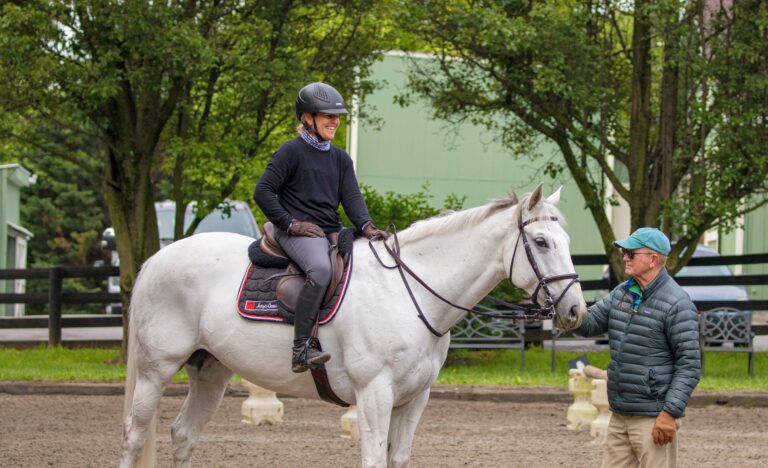
Brace yourself. The 21st century is about to rock your world. Several trends that have the potential to change our little horse world are converging on us.
For example, when a sport is featured front page and above the fold in The New York Times, it is rarely good news. A recent Times article used the sad death of a show pony to examine the widespread drugging of horses in competition. The article was all too accurate, especially when it laid out a horrifying list of medications that are in common use at every competition in the country. How horrifying was the list? I don’t know about you, but I was sickened to read how 11 medications, anti-inflammatories, corticosteroids and muscle relaxants, as described in the pony’s medication chart were given to one show pony over a 72-hour period.
Everybody’s Doin’ It
I promise you that this problem permeates our sport, in every type of competition and at every level. Positive drug tests at recent Olympics and World Championships have revealed the use of prohibited substances including pain medication, cocaine, tranquilizers, human migraine medicine and antipsychotics. None of these substances has any role in competition other than to alter the horse’s performance and most of them are not even medication for equines. To be blunt, people are drugging their horses to cheat.
“Absent a diagnosis, medicine is poison, surgery is trauma and alternative therapy is witchcraft,” according to Kent Allen, DVM. (Dr. Allen, whose practice, Virginia Equine Imaging in The Plains, Virginia, concentrates on equine sports medicine and lameness has served as a U.S. Equestrian Team veterinarian, foreign veterinary delegate and veterinary services manager at Olympics, World Equestrian Games and other Championships. He is vice chair of the FEI [International Equestrian Federation] “List” or Medication Advisory Group, serves as head national veterinarian for the FEI and the U.S. Equestrian Federation in the United States and answers sports-medicine and medication questions for veterinarians and competitors around the nation and the world.) I would add to his comment: “Saying that your horse gets nervous at competitions’ is an excuse, not a diagnosis.” Drugs are not the answer; good training and correct standards of care are the answer.
I can tell you from personal experience that this drug problem is not unique to upper levels of competition. Using drugs to alter the performance of horses happens from top to bottom. I served on both the Drugs and Medications and the Hearing Committees of USEF (at that time it was the American Horse Shows Association). I knew which drugs trainers and competitors used, and I knew where the “positives” test results that positively establish the presence of one or more substances in horses’ bodies occurred. One year we tested classes at a huge state fair, a common practice. Our technicians misunderstood their instructions and tested a local youth group’s unrecognized classes by mistake. To compound their error, they tested the draft horses showing (also in unrecognized classes) at the fair.
Naturally, AHSA got a tremendous amount of blowback from those two organizations. There were two written protests that the youth of the nation were sullied and slandered by our actions and that the honorable tillers of the soil would never recover from the dishonor we had brought upon them. Both letters were obviously written by attorneys, and you can imagine that they went on at some length. The AHSA president at the time, also an attorney, responded appropriately, rendering profuse apologies and so on. As a goodwill gesture at no charge, he enclosed the medication-testing reports for the classes erroneously tested. You guessed it: Most of the youth pleasure horses at the state fair were tranquilized, and all the draft horses tested positive for stimulants. We did not hear any further from those two organizations.
I can imagine you reading this and thinking, “That’s awful, but what’s the big deal? I don’t overmedicate my horse when I compete with him.” It’s true that the vast majority of competitors do not abuse medications when they compete. However, consider two things. First, a competition is an examination of your and your horse’s state of training and of your ability to satisfy the judging requirements through patient and correct preparation. When you compete against people who are willing to cheat to win a ribbon, you are not competing on a level playing field. Second, if you tolerate cheaters among you, then how is the outside world going to know the difference?
And speaking of judging requirements, the way we judge each discipline has an enormous effect on how horses are trained. If those requirements are not written carefully, they have the tendency to distort training practices. There will always be people willing to cheat to win. This is reprehensible at any time and even more so when an innocent horse is involved. Show me a discipline where animation and presence are overvalued, and I will show you a discipline where horses are blindfolded for hours before the competition so that they will display “animation” in front of the crowd. Such a discipline will also have a tendency to produce drug positives for stimulants.
Show me a discipline where robotic behavior is rewarded, and I will show you a discipline where horses are deprived of water for 24 hours and worked until they are staggering with fatigue. Tests on horses in this discipline will produce a disproportionate number of positives for sedatives and calming nutraceuticals. If our judging requirements are not written with a deep understanding and respect for the essential nature of our horses, then distortions and aberrations will appear and cheaters will flourish.
I know I am writing for an audience that feels as I do about this, because I talk to my readers as I travel around the country. And the message I get is this: We do not want to use chemicals as a substitute for training. I hope USEF hears that message and takes positive steps to clean up our sport. Blue Ribbon Panels are not enough. USEF is looking into various rule changes to address this. While I wish officials well with their efforts, they need to hear from you and now’s your chance. A nationwide series of USEF Town Hall Meetings on drug and medication issues is in progress right now. For more information, go to www.usefnetwork.com/featured/?USEFTownHallMeetings. Or write the senior representatives of your discipline, telling them to support reform efforts in this area. You can find their contact information at www.usef.org. (Go to the “About USEF” bar and then click on “Committee List.”)
Anything we can do will be an improvement.We are never going to completely prevent humans from using drugs to obtain an unfair advantage (just ask Lance Armstrong). At the same time, in this modern era, if we don’t clean house, some outside agency is going to come in and fix it for us.
The Elephant in the Room
All we need to blow the lid off our sport is a good, juicy scandal. For instance, suppose some billionaire loses a horse due to overmedication and then discovers that his or her trainer has been consistently taking huge undisclosed commissions on the purchase of horses for the billionaire’s show stable. Horses, drugs, crooks–if any of you have some time on your hands, you can write it up and hit the bestseller list. All that is missing is sex, but if you call it 50 Shades of Bay, I guarantee Hollywood will be knocking on your door. (Sorry, when I deal with something this serious, my sense of humor kicks into high gear.)
The part about the undisclosed commissions is the elephant in the room: Any professional in the horse world knows it is there, but nobody wants to talk about it. An undisclosed commission by an agent can be fraudulent and illegal, and it could subject the recipient of the undisclosed commission (and also the person paying it) to substantial penalties. We all know this is going on, yet we have no horseman’s code of ethics. It is generally accepted that horses are a big business these days, and professionals are making a living from it. My point here is that if we do not have a code of ethics, how is “60 Minutes” going to tell the good guys from the bad guys when they show up on your doorstep? If you tolerate it, you are part of the problem, not part of the solution. The first step to improvement is to admit that you have a problem, and boy, does the horse world have a problem.
Disappearing Space
Drugs and ethics are not the only problems we have. The next trend I see coming is so serious that I have to resort to humor to deal with it. The story I tell is that I was sitting in a bar discussing “Star Trek” with William Shatner. “William, your show has Martians and Klingons on it. Heck, you even have Democrats and Republicans. You have everything and everybody on ‘Star Trek,’ but there are no horsemen– why is that?”
William Shatner replied, “Well you see, Jim, ‘Star Trek’ is set in the future.”
Yeah, you’re right, that’s not very funny. But when we run out of places to ride in the future, there won’t be any horses. That’s not funny, it’s the truth. Statistics regarding loss of open space make for scary reading. Almost every facility I work at these days has lost open space around it. Bulldozers and horses do not coexist. The change in your lifestyle can occur so quickly that you don’t believe what can happen to the lovely field where you used to hack. Concrete and pavement are like plutonium; they are forever. Once land is paved over, it is forever lost to the horse world.
Many farms along the mid-Atlantic coast, where I live, are under tremendous pressure from developers and planning commissions. Yet those farms and their attendant open space are a priceless part of our national heritage. We are losing that heritage at an ever-increasing rate. But if you lose your heritage, you lose your identity. If you lose your identity, you lose your community, and if you lose your horse community, you will lose your horse.
Just as with the drug rules under consideration, there are things you can do, but you do not have as much time as you think. Get in touch with your local land-use organizations and ask how you can help. A good place to start is with the Equine Land Conservation Resource (www.elcr.org). ELCR can guide you to organizations in your area that are working to preserve open space for you and future generations. If you care about your horses, you need to take part in the efforts to preserve your way of life.
Brace yourself: Become aware and become involved ?before it is too late.
This article originally appeared in the June 2013 issue of Practical Horseman.










